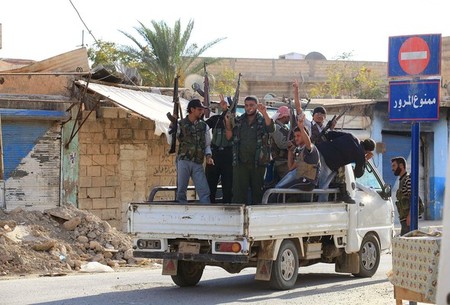Should the U.S. arm Syria's rebels? A debate

Walter Russell Mead responds to my skepticism about arming Syria's rebels:
The worst case for the United States in a post-Assad Syria would be that groups linked to al-Qaeda become dominant players either in the countryâ??s government as a whole or in control of significant regions in a country that fragments. Such groups would be nests of terrorists acting to destabilize not only Syria itself but Iraq, Lebanon, and the wider Middle East. They would certainly be active in Russia and, through extensive ties with the Arab diaspora in Europe, add considerably to the security headaches the West faces....Aiding the less ugly, less bad guys in the Syrian resistance, and even finding a few actual good guys to support, isnâ??t about installing a pro-American government in post civil war Syria. Itâ??s about minimizing the prospects for a worst-case scenarioâ??by shortening the era of conflict and so, hopefully, reducing the radicalization of the population and limiting the prospects that Syrian society as a whole will descend into all-out chaotic massacres and civil conflict. And itâ??s about making sure that other people in Syria, unsavory on other grounds as they may be, who donâ??t like al-Qaeda type groups and donâ??t want them to establish a permanent presence in the country, have enough guns and ammunition to get their way.
While I think Mead is right not to oversell his prescription, I fear this may be wishful thinking. First, weapons are fungible. There is no way - short of some of the high-tech and probably implausible solutions sketched here - for the U.S. to only arm the people it wants. Once weapons go into Syria, Washington will have zero control over who gets what, which means the more lethal instruments we pour into the country, the greater the odds anti-American forces will lay their hands on them.
Second, where is the evidence that the introduction of better weaponry will shorten the conflict? I can see the argument for how it might - if the rebels take down more regime planes and helicopters for instance, it might break the will of pro-regime forces to fight. But Assad's survival thus far is indicative that he has more than mere cronies and mercenaries fighting on his behalf. If the regime and its Alawite supporters believe they are fighting for their very survival, they are going to keep on fighting to the bitter end, which means for the rebels to prevail they will have to engage in ethnic cleansing of a sort. So the argument that arming the rebels will shorten the conflict is an assumption - not a fact. It may just intensify the bloodshed and suffering inside Syria without achieving a decisive victory for our side.
Mead argues that arming the "less bad" elements in the Syrian revolt will insulate a future Syrian government from being ruled by al-Qaeda sympathizers or prevent portions of the country from falling under al-Qaeda control. Unfortunately, the minute the protests against Assad became violent, some portions of Syria were going to fall prey to jihadists. This was a legacy of, among other things, Assad's cultivation of jihadist groups and the invasion of Iraq, which cracked western Iraq open to foreign fighters who have funneled themselves into Syria (pdf). Preventing more territory from falling into al-Qaeda's hands means arming a proxy force to fight those groups once Assad falls: once the first Syrian civil war ends, a second battle has to be undertaken to uproot whatever jihadists have taken refuge in the country.
This second phase - arming a post-Assad regime to fight jihadists - makes more sense (it's something the Obama administration is doing in Libya), since custody of American weapons would at least be transferred to a nominal government that is coherent and answerable to us. But that should await the fall of the current regime.
As Mead notes, the U.S. doesn't have any good options and doing nothing is not without risks. But in such an environment I think caution is warranted. Pouring advanced weapons into a country with a disorganized and often anti-American rebellion is a recipe for trouble.
(AP Photo)



